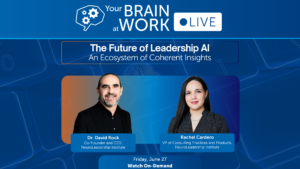Stress is the defining affliction of modern life — ubiquitous, unending, and seemingly unavoidable.
Fortunately, it doesn’t have to be this way. By understanding the neuroscience of how it operates, we can learn to target stress at its source. At NLI, one part of this involves helping leaders develop a growth mindset — the belief that challenges are opportunities to improve, not threats to status or identity.
When employees develop a growth mindset, research suggests they’ll enjoy a much greater advantage when stressful situations come their way.
What stress really is
Cognitively, stress is little more than heightened attention to the negative.
In a 2018 study published in The Journal of Neuroscience, researchers induced stress in participants by telling them they’d be delivering a surprise public speech in front of a panel of judges. They measured stress with tests of skin conductance, cortisol levels, and self-reported anxiety. What they found was that stressed-out participants were more accurate at estimating the risk of dangerous events than participants who weren’t stressed.
When we understand stress in this way, it points us toward a logical solution: reorienting our thoughts back to positive information. How can we do this? By shifting our thinking to a growth mindset.
Reducing stress with growth mindset
While stress-fighting techniques like exercise and meditation can reduce baseline anxiety and calm excitatory neurons, they don’t address the cognitive causes of stress within the brain. But if we take stress as an affliction spurred on by misallocated attention, growth mindset may hold a solution.
Growth mindset assumes that skills are simmering wells of possibility and potential, rather than fixed traits. In personal and professional settings, people can develop their faculties, acquire new abilities, and strengthen their existing capacities. Seeing the world through the lens of growth enables you to steer your thoughts away from the negative focus induced by stress and back toward the positive.
When you cultivate a growth mindset, you don’t worry so much about problems. Instead of wondering how you’ll get through a crisis, you ask yourself a far more constructive question: “What can I learn from this situation to better develop my skills?”
One place where leaders take that wisdom to heart is Microsoft. Last year, the NeuroLeadership Institute partnered with Microsoft to help instill a culture of learning in which managers reward their employees for growth, and recognizing and learning from failure.
Instead of stressing over problems, employees now use growth mindset to see opportunities for improvement. Stressful situations still arise — and they always will. But with a growth mindset, employees feel equipped to respond in a positive and constructive manner.
Even if you don’t happen to be a leader at one of the world’s most valuable companies, the wisdom holds true. Stress may be the leading affliction of modern life, but with the right mindset people have the power to make it disappear as suddenly as it arrived.
This article is the eleventh installment in NLI’s series, Growth Mindset: The Master Class, a 12-week campaign to help leaders see how the world’s largest organizations are putting growth mindset to use.
[action hash=”cd97f93c-1daf-4547-8f7c-44b6f2a77b77″]






